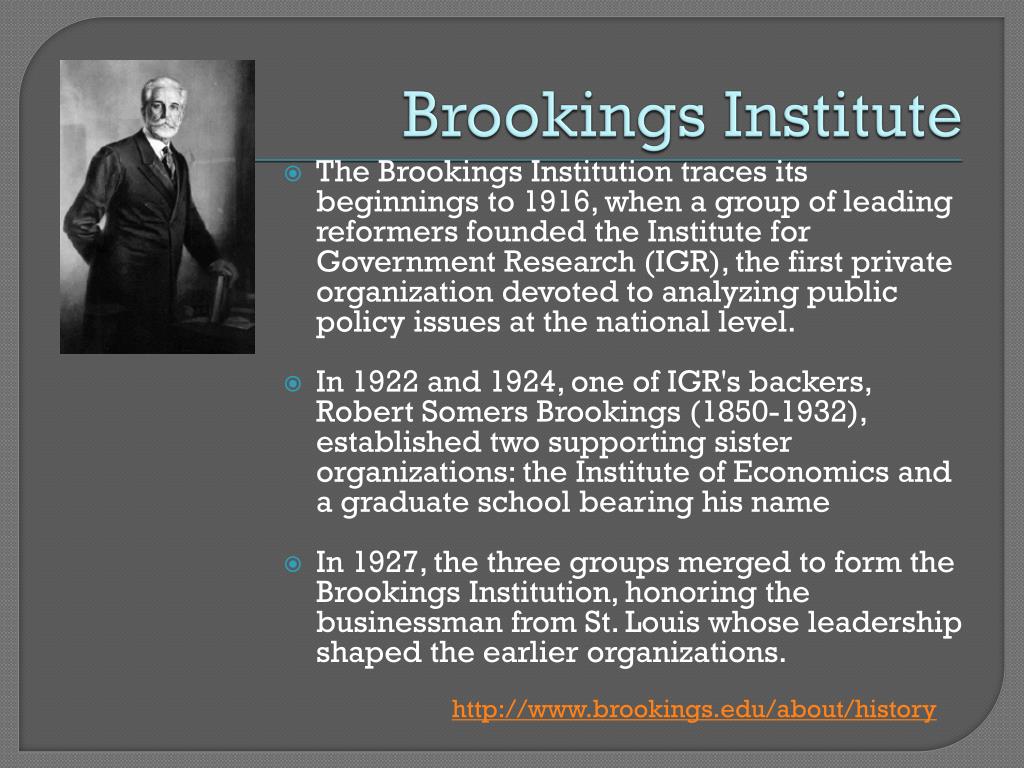Is the Brookings Institution a bastion of liberal thought, or does it offer a more nuanced perspective on the complex issues facing the United States and the world? While often perceived as leaning left, the reality is far more intricate, with the institution striving for a balance that reflects the diverse viewpoints necessary for impactful policy analysis. This article delves into the complexities of the Brookings Institution, examining its history, mission, and the perceptions surrounding its ideological leanings.
The Brookings Institution, a venerable name in Washington, D.C., has a long and storied history. Founded in 1916, it predates many of its peers in the think tank world, including the Heritage Foundation, which came into being in 1973. The institution's longevity is a testament to its staying power and its ability to adapt to the ever-shifting landscape of American politics and global affairs. It began as the Institute for Government Research, and it quickly established itself as a pioneer in the realm of policy analysis, setting the stage for generations of think tanks to follow.
The Brookings Institution is, at its core, a nonprofit organization. This status is crucial, as it shapes the institution's structure, funding, and overall mission. It is based in Washington, D.C., the epicenter of American political power. This geographic location is strategic, providing close proximity to policymakers, government agencies, and other influential organizations. This close proximity allows Brookings to engage directly with those shaping policy, allowing its research to have a direct impact on the issues of the day.
The organization's mission is ambitious: to conduct independent research and offer policy solutions. Brookings covers a vast array of topics, from economics and foreign policy to metropolitan policy and governance. This breadth of focus allows the institution to address the interconnected challenges facing the world and offer comprehensive analysis. Its research takes shape through a variety of means, including publications, reports, and public events. The institution's scholars are regularly sought after by the media and policymakers alike.
The funding of the Brookings Institution is a significant factor in understanding its operations. As a nonprofit, it relies on a diverse portfolio of funding sources, including grants from foundations, individual donations, and corporate sponsorships. While these sources provide the financial stability needed to support its research, they also raise questions about potential biases. The institution is transparent about its funding sources, and it publishes this information online. Such transparency is key to assessing the institution's independence and its approach to research.
The Brookings Institution's approach to scholarship emphasizes independent research. The organization prides itself on offering analysis that is not tied to a specific political agenda. Its scholars are encouraged to conduct rigorous research, utilizing a variety of methodologies, and to present their findings without fear or favor. This commitment to independent thought is designed to ensure that the institution's work is taken seriously by policymakers across the political spectrum.
- The Parker Family Kais Christmas Reunion More
- Cody Walker News Family And Updates On The Actor 36 Years Old
When considering the perceived ideological leanings of the Brookings Institution, one must acknowledge the broader context of think tanks in the United States. Think tanks, in general, play a crucial role in the American political landscape. They act as centers of expertise, providing policymakers with information and analysis on the issues that matter most. However, they are often perceived through a partisan lens, with different organizations seen as aligning with either the left or the right. The Heritage Foundation, for example, is a prominent conservative think tank, while Brookings is often associated with a more liberal perspective. It is worth noting, however, that the political leanings of think tanks can vary. And the perception of a think tank might not be as simple as labeling it as liberal or conservative.
The relationship between think tanks and the media is critical in shaping public perception. Think tanks often rely on media coverage to disseminate their research and influence public opinion. Media sources, in turn, rely on think tanks for information and expertise. The result is an interplay that can amplify certain perspectives and shape the narrative around key policy issues. Some media outlets lean towards specific political viewpoints, which can influence how they portray think tanks. For example, media sources with a slight to moderate liberal bias may tend to highlight research from Brookings, while those with a conservative bias might downplay its findings or emphasize its perceived liberal leanings. This dynamic means that consumers of news should be aware of the media's biases and consider multiple sources when forming their own opinions.
The staffing and leadership of the Brookings Institution also play a role in shaping its identity. The institution attracts scholars, researchers, and policy experts from a wide range of backgrounds. While it is frequently perceived as more liberal, it also employs individuals with conservative viewpoints. In reality, Brookings strives to create an environment where multiple perspectives can be presented, adding nuance to the complex topics it studies. The backgrounds of these individuals, their affiliations, and their past work experiences all contribute to the overall intellectual climate of the institution. This diversity is important, because it allows for a range of views to be considered in the analysis and policy recommendations offered by Brookings.
The question of whether Brookings is "conservative or liberal" is not easily answered. The institution's research encompasses a wide spectrum of viewpoints, and its scholars often engage in debates with each other. An analysis of congressional records from 1993 to 2002 found that Brookings was referenced by conservative politicians almost as often as liberal politicians. This suggests that the institution's work is valued by both sides of the political aisle.
When assessing the ideological balance, it's important to remember that the political landscape is complex. Individuals often hold views that fall along a spectrum, rather than neatly fitting into pre-defined categories. Public opinion research, such as surveys conducted by reputable polling organizations, provide valuable insights into the attitudes of Americans. We can group respondents who describe themselves as "liberal" or "very liberal" together, and compare them to those who describe themselves as "conservative" or "very conservative." Such analysis helps to understand how different groups perceive and prioritize political issues. However, these surveys are simply snapshots in time, and they don't capture the full complexity of the American political landscape.
Brookings' engagement with the public is essential to its mission. The institution hosts public events, publishes reports, and maintains an active online presence. These activities are designed to promote informed debate and discussion on the issues of the day. The institution's website, for instance, makes a wealth of research and analysis available to the public. Events, from book talks to policy briefings, bring together scholars, policymakers, and members of the public to discuss pressing issues. Such engagement is intended to ensure that the institution's work is accessible and relevant to a broad audience.
In the world of policy, funding and partnerships often come under scrutiny. The Brookings Institution, like other think tanks, relies on a complex network of financial support. The John D. and Catherine T. MacArthur Foundation, for instance, has provided significant grants to support the institution's programs. Such grants can enhance the institution's capacity to conduct research and expand its initiatives. Brookings has also announced efforts to raise matching funds to support its work. While these partnerships are valuable, it's essential to assess their potential impact on the institution's direction and the independence of its research.
Ultimately, the Brookings Institution aims to provide independent research and policy solutions. It aspires to inform the debate on important issues and contribute to the development of effective policies. The organization's commitment to independent research, diverse perspectives, and public engagement reflects this broader goal. Despite the challenges of operating in a polarized political environment, the Brookings Institution strives to remain a trusted source of information and analysis. The path forward involves maintaining a commitment to intellectual rigor, embracing a variety of viewpoints, and actively engaging with policymakers and the public. Brookings intends to continue to adapt to the changing political climate, offering analysis that is both relevant and valuable.
Conversations with people around the industry reveal a complex picture: Brookings, despite any criticism or praise it receives, aims to be a force for informed discussion, not a proponent of a rigid ideology. Its influence on policy is a testament to its enduring role in the American landscape.
For all the joy that conservative pols have taken at Brookings latest turn in the barrel, conversations with people around the industry reveal an irony: that any potential new wave of government
To put this scenario in context, one common narrative about American voters is that they are liberal and democratic leaning in their youth and grow more conservative and republican leaning as they age.
One of Washington's oldest think tanks, Brookings conducts research and education in the social sciences, primarily in economics, metropolitan policy, governance, foreign policy, and global economy and development.
Brookings has a fair number of liberals in its ranks, but not to the exclusion of conservatives.
The Brookings Institution is a nonprofit organization devoted to independent research and policy solutions.
In conclusion, while perceptions and labels might be tempting, the reality of the Brookings Institution is one of complexity. The institution's longevity and influence, its diverse areas of study, and its efforts to promote independent research all contribute to an image that is far more nuanced than simple political labels. The Brookings Institution remains a vital player in the realm of policy, offering insights that attempt to shape the critical issues of our time.
| Brookings Institution: Key Facts | |
|---|---|
| Founded: | 1916 in Washington, D.C. |
| Type: | Nonprofit Public Policy Organization / Think Tank |
| Mission: | Conduct independent research and policy analysis on foreign policy, metropolitan policies, and economics. |
| Main Areas of Focus: | Economics, Foreign Policy, Metropolitan Policy, Governance, Global Economy and Development |
| Ideological Leaning: | Generally perceived as center-left, but aims for a balance of perspectives |
| Funding: | Grants from foundations, individual donations, corporate sponsorships |
| Notable Programs: | Numerous programs covering a wide range of policy areas |
| Key Figures: | Scholars, researchers, and policy experts from diverse backgrounds |
| Public Engagement: | Public events, publications, online presence |
| Website: | https://www.brookings.edu/ |
- Exploring Beaufort History Attractions And More
- Discovering Tyler Sweet From Helix To Headlines Beyond


